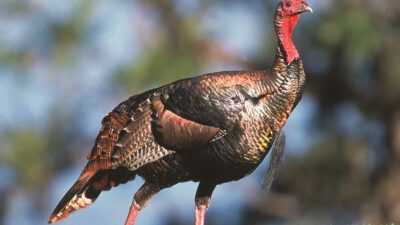Most wild turkeys aren’t much bigger than a duck. So if someone giggles when you express concern over being attacked by a wild turkey, then that’s probably the image in their mind. However, male wild turkeys can stand as tall as 4 feet and weigh 18+ pounds. They can also be very aggressive, especially during breeding season. Here are some tips on what you should do if you ever are attacked by a wild turkey.
Table of Contents[Hide][Show]
- Don’t back away. Stand your ground and do not let the turkey intimidate you. Otherwise, the attacking turkey(s) might become more aggressive like in this video of turkeys attacking a family.
- Look big and threatening. Wave your arms, jacket, shirt or whatever else you have on you. Try to visually look as big as possible.
- Make a lot of noise. Calp your hands and yell at the turkey. Noise can also help scare them.
- Charge the turkey. Start running towards the turkey. Most birds, including wild turkeys, are easily intimidated and should leave the area if threatened.
- Don’t show fear. Even if you are scared, don’t show it. All animals can sense fear. Your fear will encourage them to attack you.
How To Prevent A Wild Turkey Attack
The best way to win a fight is never to get in one in the first place. There are a few things you can do to help prevent a wild turkey attack.
- Don’t feed them. If you frequently see wild turkeys in your backyard, resist the urge to feed them. Feeding just a couple wild turkeys can lead to a permanent flock inhabiting your property. What’s worse, feeding wild turkeys will cause them to become aggressive and lose their natural fear of humans.
- Remove bird feeders. Wild turkeys will often feed on loose seed under bird feeders. Remove the feeders until the turkeys have moved on from your area.
- Cover up compost piles. Your composting food waste will attract all kinds of wild animals, including wild turkeys. Cover up your compost area and discontinue using it if necessary.
- Fence garden areas. Your garden is another potential food source for wildlife. Make it inaccessible to the turkeys.
- Reduce reflective surfaces. When a wild turkey sees their reflection, their initial instinct is to attack, especially during breeding season. Mirrors, glass windows and doors, and other shiny surfaces can all bring out the worst in turkeys as they try to establish dominance and find a mate. Aggressive wild turkey behavior may include charging, ramming and pecking.
- Call wildlife control. If you can’t get the turkeys to leave your area, then call your local animal control division. Remember, even if a wild animal is harassing you or causing property damage, it may be illegal to kill them.
Wild Turkey FAQ
- How big can a wild turkey get? Some can grow as big as 4 feet and weigh about 20 lbs. Even without hopping or flapping their wings, that puts their sharp beak in an uncomfortable proximity to your face and your eyes.
- Is a turkey an animal capable of attacking humans? Yes. Wild turkeys have a bad reputation for invading neighborhoods and attacking both people and other animals.
- How dangerous is turkey during breeding season? Wild turkeys are extra aggressive during their breeding season.

Frank Wilson is a retired teacher with over 30 years of combined experience in the education, small business technology, and real estate business. He now blogs as a hobby and spends most days tinkering with old computers. Wilson is passionate about tech, enjoys fishing, and loves drinking beer.






















 The 10 Most Expensive Items On Amazon
The 10 Most Expensive Items On Amazon
Great tips! It’s always good to be prepared in case of an encounter with (checks notes)… a wild turkey.
If you’re attacked by a wild turkey, the best thing to do is to stay calm and avoid making any sudden movements. Try to keep your eyes on the turkey and stay as still as possible. If you can, try to make yourself